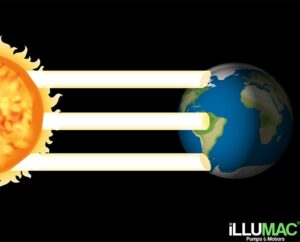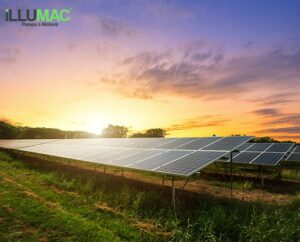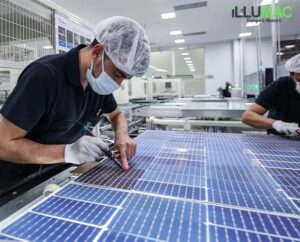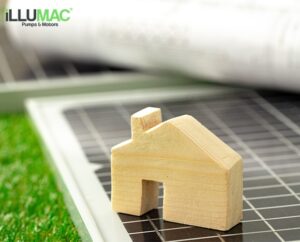The advantages of installing solar panels at home are numerous. You need to consider many aspects while adding solar panels, such as energy efficiency, appearance, and expenses. These are crucial elements that will greatly influence your choice. The kind of solar panels you decide to purchase is among the most crucial factors in solar panel purchases.
In the end, your particular scenario and your goals will determine which solar panel is best for you. This practical guide will explain the many solar panel kinds, their advantages, and how to choose the finest solar panels for you.
Which Three Types of Solar Panels Exist?
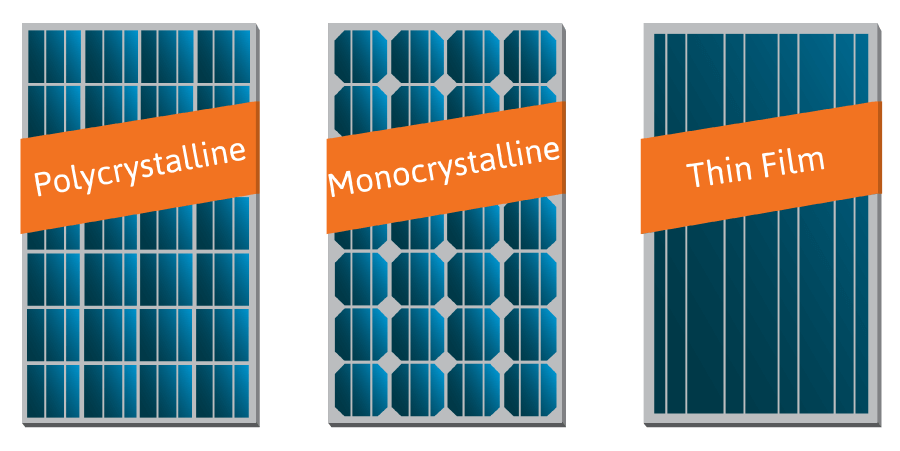
Monocrystalline, polycrystalline, and thin-film solar panels are the three different types of solar panels. These many solar cell types are each constructed in a distinctive manner and have various aesthetic qualities. Here is a summary of each kind of solar panel.
Monocrystalline Solar Panels
Of the three types of solar panels, monocrystalline panels are the most advanced. This kind of solar panel is manufactured from monocrystalline silicon solar cells.
The Czochralski method, which involves setting a silicon crystal in a vat of molten silicon, is used to create these cells. The crystal is then gently and carefully removed, allowing the molten silicon to cool and solidify into an ingot-shaped crystal shell. A cell is created by cutting this ingot into thin silicon wafers. To create a solar panel, these cells are arranged.
The monocrystalline cells, when fully formed, resemble squares without corners and have little spaces between them. Although you can select from a number of colours for the frames and back sheets, these sorts of solar cells will seem black due to the pure silicon in them.
Polycrystalline Solar Panels
Polycrystalline solar panels are becoming more popular due to their efficiency. Although polycrystalline cells are produced using more recent technology, they still employ silicon, just as monocrystalline solar panels.
This process involves melting silicon crystal fragments together in a vat of molten silicon. The crystal isn’t progressively extracted; it’s just allowed to break up and cool. The silicon is cut into polycrystalline solar wafers after cooling in its mold, which is then arranged to form a panel.
The cells of polycrystalline crystals appear blue when sunlight reflects on them. Fragmented silicon will look lighter and more bluish in color as opposed to pure silicon, which appears black in sunlight. There are no gaps between the square-shaped polycrystalline panels. Silver is the most common color for frames.
Thin-Film Solar Panels
This kind of solar panel is the most recent. Due to its special flexibility and manufacturing method, thin-film solar panels are the most adaptable of the three. They may be created from a variety of materials, including amorphous silicon, copper indium gallium selenide (CIGS), and cadmium telluride (CdTe) (a-Si).
The substance is sandwiched between thin sheets of conductive material in this procedure, with a protective glass layer placed on top. Non-crystalline silicon is used in the glass-topped a-Si panels.
The thin look of this form of the solar panel makes it simple to recognize; compared to solar panels constructed from silicon wafers, thin-film panels are about 350 times thinner. However, thin-film solar panels’ frames can still be substantial and resemble those of the other two varieties. These panels’ colors will vary depending on the material, although they are typically black or blue.
Monocrystalline vs. Polycrystalline vs. Thin-Film
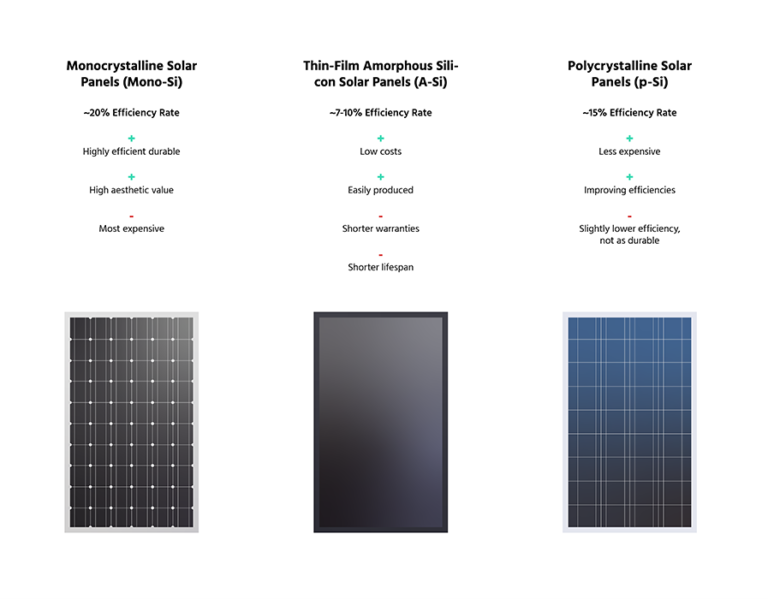
Efficiency
Efficiency is the amount of energy that each type of solar panel can generate given the amount of sunshine that it receives. In essence, a solar panel’s efficiency dictates how much power it can generate. There are a lot of things you can do to boost the effectiveness of your solar panels, but some solar panels are made to be more efficient right out of the box. The monocrystalline solar panel is the most effective type.
The efficiency of monocrystalline solar panels can exceed 20%. Conversely, polycrystalline panels often only achieve 13–16% efficiency. In the future, as technology advances and polycrystalline panels become more efficient, the difference between the two panels may be closing.
Typically, thin-film efficiency ranges from seven to 18 percent. Because there is no industry standard size for thin-film panels, the power capacity of one model may be greater than that of another.
Cost
The type of solar cells you select is one of the aspects that will have the biggest impact on the price, and it can make or break your decision to go solar. Thin-film solar panels are the least expensive since they can be produced for the least amount of money. The most affordable solar panels available are called Illumac.
Since thin-film frames are typically lighter, you may frequently reduce installation expenses. On the other hand, monocrystalline solar panels are currently the most expensive choice. Due to the high cost of manufacturing pure silicon as well as the weight of the panels and frames, installation expenses are higher.
Solar panels’ price was brought down by the development of polycrystalline panels, which are often less expensive than monocrystalline ones. However, if researchers find more effective techniques to make monocrystalline solar cells, this gap between monocrystalline and polycrystalline panels may narrow. Remember that there are frequently additional charges for installation and monitoring on top of the price of the solar panels.
Other considerations include temperature coefficient, hail and fire resistance, UL and IEC listings, and more.
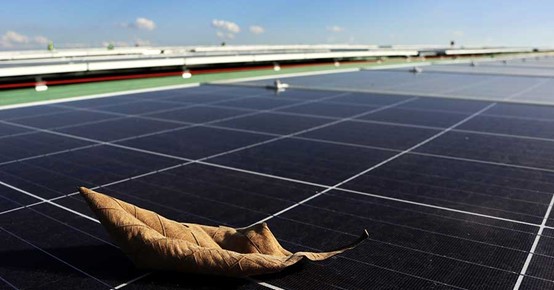
When purchasing solar panels, there are various considerations to take into account in addition to price and efficiency. The temperature coefficient is one element. Temperature coefficients for monocrystalline and polycrystalline solar panels typically range from -0.3%/°C to -0.5%/°C. Coefficients for thin-film panels are closer to -0.2%/°C.
This implies that some solar panel types will produce more power than others when the temperature rises. In a place like North Carolina, where the temperature high might be large, this is especially vital to take into account.
The fire rating should also be taken into account because it can differ depending on the type of roof you have and the panel you choose. You should take hail ratings into account as well as fire isn’t the only natural calamity that could damage your roof. Although the specific rating can vary and have an impact on the longevity of your solar system, most monocrystalline and polycrystalline panels can withstand a 25mm object falling from a height of about 50 miles per hour.
Additionally, you might want to think about finding heterojunction solar cell technology (HJT), which mixes monocrystalline silicon wafers with amorphous silicon, for your system. HJT has the lowest temperature coefficient, the highest peak efficiency, and no light-induced degradation (LID). Finally, you should think about LID because decreased efficiency can reduce the amount of energy you can generate.
Our engineers take into account each of these different variables when designing and advising a solar PV system. We consider the total system lifecycle and efficiency under all circumstances that your solar PV system will encounter, not just the best-case situations.
It is a good idea to have a fundamental understanding of how solar panels operate, but we recognize that selecting the right sort of solar panels can be challenging. Illumac’s solar professionals are on hand to evaluate your requirements and guide you toward the best choice for your particular situation.
Solar panels: Monocrystalline vs. Polycrystalline
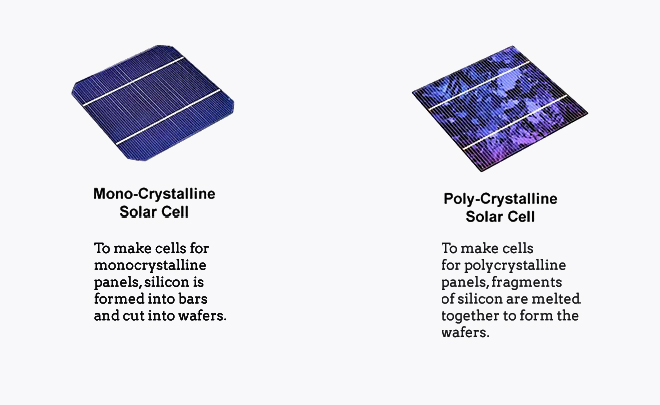
So which type of panel—monocrystalline, polycrystalline, or thin-film—is better? The optimum solar panel type will depend on the panels’ use and the location of installation. Polycrystalline solar panels could be the ideal option for homes with vast roof spaces or properties. For vast expanses, these panels are the most cost-effective option that yet delivers adequate efficiency and power. Monocrystalline solar panels might be the best option for homes with compact spaces. For people who want to minimize their energy costs while occupying a tiny location, these panels are effective.
Both monocrystalline and polycrystalline solar panels are suitable for use in residences and other comparable structures. Due to their reduced efficiency, thin-film solar panels are nearly never utilized in dwellings. Thin-film solar panels, on the other hand, are ideal for commercial structures that cannot support the added weight of conventional panels. Commercial roofs have more space to cover more of the roof with panels, despite the thin-lower film’s efficiency.
Which Solar Panel Type Is Best?
You may make your choice more focused by considering all the different solar panel kinds and learning about each one’s special qualities. However, the greatest solar panel for you will probably depend on your particular circumstances. Be sure to consider what you need most so that you can select the finest choice for you.
Think about some of the important considerations, such as function, size, and cost:
- Function: What is your primary motivation for wanting to get solar panels? You might be attempting to reduce your energy footprint or looking for ways to reduce your energy expense. Your choice of solar panels might be influenced by determining your main motivation for making the switch to solar power.
- Size: Consider the area and the quantity of equipment you’ll need to power. A small, straightforward house can need a different kind of solar panel than a large residence with more advanced features.
- Cost: Your budget is one of the most important things you’ll want to take into account when selecting the best solar panels for your needs. Going in with a budget range in mind can keep you on track and enable you to choose the ideal solar panel for you, even though you can still stray a little from a specific number.
As you buy for solar panels, be sure to keep these crucial qualities in mind. You may still require further assistance to select the ideal product, despite the fact that being aware of the many variations in type distinctions and determining what you require can be beneficial in the process. Make sure to look for industry experts that can guide you toward the ideal product.
Contact Illumac
Our professionals at Illumac can assist you in choosing the appropriate solar panels for your particular project if you are unsure about which sort of solar panel will be most effective for your needs or if you need some assistance in comprehending solar panel technology.
Illumac provides both residential and business clients with cost-efficient solar systems. We provide you with a number of benefits, from knowledge to energy savings:
- Expertise: We assign a local project manager to each of our customers to ensure effective communication, ongoing engagement, and high-quality installation throughout the entire process. These project managers are skilled in both engineering and construction, and they know just how to install your solar panels. You’ll be able to relax knowing that the process is being handled by a qualified expert.
- Items of great quality: At Illumac, we make sure to provide our customers with the most recent and best products available. You can rely on the strength and efficiency of our goods. Our engineers are prepared to make rapid repairs if something goes wrong.
- Savings: Following the installation of your solar panels, you’ll soon start to experience energy savings. Solar panel installation is a long-term investment that will pay off.
Your business or home can benefit from solar panel installation assistance from Illumac. Illumac is the best option because of its knowledge, high-quality goods, affordable costs, and savings. To begin locating the ideal solar panels for you, contact us.


